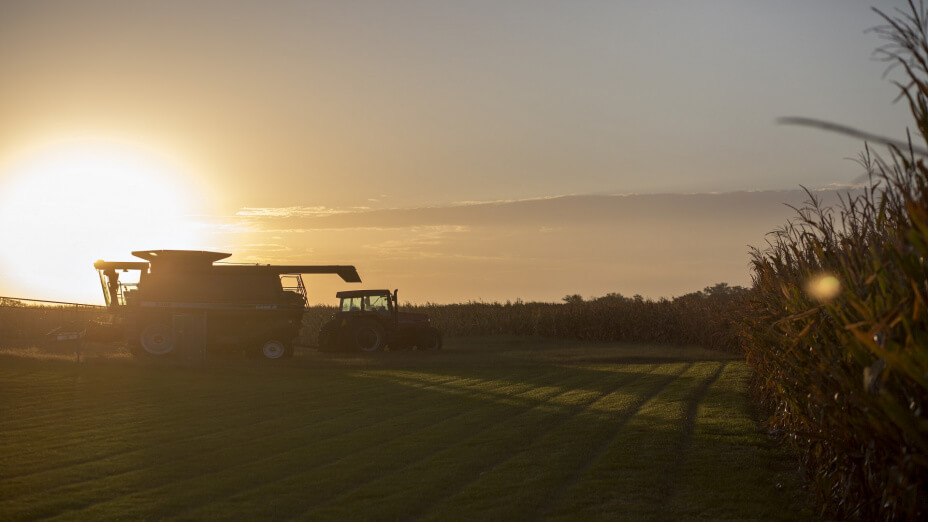New technology solutions in agriculture: Where can they take the industry?

The agricultural industry is an ever-growing field with new problems and solutions being created every day. Learn more about what biotechnology is doing to help.
How biotechnology solutions can deliver benefits
There are multiple ways biotechnology can deliver benefits, including bioyield and biocontrol. Bioyield aims to enhance plant nutrition and stimulate plant growth, while biocontrol aims to control insects and microbial diseases that are doing harm to plants.
Bioyield solutions can both increase nutrients and improve crop yields. Through biocontrol, manufacturers can produce more sustainable and environmentally friendly pesticides and insecticides.
As the need for more food increases, more pressure is put on the agriculture industry, resulting in new problems that require innovative solutions. Getting high yield while doing it in a sustainable manner is necessary, but that cannot be achieved without biocontrol or bioyield technology.
Current technology trends in agriculture
The global population is increasing and is not expected to slow any time soon. With more people comes more need for food, and the agriculture industry is constantly developing more efficient ways to grow food.
That’s where biotechnology comes in. Some recent trends have included short stature corn, CRISPR, blockchain technology, regenerative agriculture, and enzyme technology.
Short stature corn
Corn is the second-most grown crop in the world, so any improvement to its yield would have a significant impact. Short stature corn, a recent innovation, is a hybrid crop which grows differently than current corn, growing shorter and sturdier. Due to its short stature, this hybrid corn has stronger roots, which increase tolerance against winds that would knock taller plants down. Further, its stature allows for more corn per square meter, reducing usage of land and other nutrients like nitrogen and water. Lastly, the new crop has a longer season. Short stature corn is an example of a bioyield innovation.
CRISPR
CRISPR (Clustered Regularly Interspaced Short Palindromic Repeats) is a genome editing tool that allows for altering of DNA sequences and functions. Other than treating and preventing diseases and improving crops, it can also be used to correct genetic defects in human cells. Recently, it has been used to create resistance to diseases and pests that kill crops, as well as developing new and improved versions of crops we already have. For example, CRISPR is being used to modify the cacao plant to allow it to resist diseases that have the potential to make the crop extinct over time. CRISPR has also been used to fight pests and diseases in plants such as bananas, papayas, squash, and tomatoes.
Novozymes has explored using CRISPR to generate genetically engineered microbes for our Nitrogen Fixation project. Nitrogen fixation is a biological process only found in prokaryotes where they use inert atmospheric nitrogen (which composes about ~80% of the atmosphere) and convert it directly into ammonia, which is a form usable by cells. The Nitrogen Fixation project has the goal of supercharging natural nitrogen-fixing microbes using gene editing to produce a strain able to replace 25% of the synthetic fertilizer required by corn.
Thus far we have not been able to use CRISPR in our nitrogen-fixing microbes. CRISPR may be something we explore more in the future, but right now we are focused on more “conventional” means of genetic engineering that have been more successful.
Blockchain technology
For a lot of consumers, it’s important to know where their food comes from and how it’s produced. Recently, a technology has been created to allow for a thorough history to be attached to each product. Blockchain technology is a tracking system that follows a product throughout the entire supply chain, recording its exact movements and locations as it makes its way to consumers.
For example, a farmer growing sustainably-raised tomatoes either uses smart sensors or, say, an app that allows for the tracking of information about the crop – from crop quality to the type of seed used. This information is updated at every step along the supply chain, ensuring regulatory compliance and, for both the grocer and the consumer, quality produce. Then, when the consumer shops for the product, that produce is accompanied by a QR code that the consumer can scan to immediately see the product’s entire history.
Now, consumers can be certain that their products were raised sustainably and that paying extra for those attributes was justified. Furthermore, giving consumers a way to verify how their products got to them increases trust between them and producers, leading to increased sales and loyalty.
Regenerative agriculture
With climate change being a huge issue in our world today, scientists are always looking to minimize its effects. Regenerative agriculture is defined as farming and grazing practices that reverse climate change by rebuilding soil organic matter and restoring degraded soil. This new technology is credited with improving the water cycle and reducing carbon.
In regenerative agriculture, many techniques are used to ensure revitalization of the land it is used on. For example, techniques such as conservation tillage, mobile animal shelters, pasture cropping, cover crop, composting, and crop rotation. Together, these lead to healthier soil that can produce improved crops and more productive farms.
Enzyme technology
Enzymes are nature’s smart catalysts and can be used to effectively control pests and many other uses. They have significant potential to limit damage done by pests that cost farmers billions of dollars each year. Enzymes can be used by themselves or in combination with low amounts of chemical application. For crops that are infested with pests or susceptible to infestations, enzyme biocontrol technology can be applied to both eliminate the pest and protect the crop.
Enzyme technology is fast acting and performs close to a chemical solution. They are a much more sustainable solution as they are biological and rapidly degrade into harmless amino acids, unlike chemicals. For crops, enzymes help them to grow and thrive, leading to an even better yield, while still using sustainable products to achieve that.
At Novozymes, we have partnered with FMC to enter the biocontrol segment of agriculture. We hope to be able to work together to replace or reduce chemical pesticides with our more sustainable solutions. Our partnership will focus on FMC’s diamide insecticide technology and will target solutions for controlling Asian Soybean Rust, which is a very problematic fungal disease in South America.
Can we help boost your yields and protect your crops?
Our dynamic portfolio of biological solutions is derived from naturally-occurring microbes and enzymes. Microbial inoculants in our bioyield solutions complement traditional fertilizers. They increase the availability of key nutrients such as nitrogen, phosphorus and potassium. The result is improved crop yields. Our biocontrol solutions unlock new potential to fight pests and disease supplementing an Integrated Pest Management (IPM) and Integrated Resource Management (IRM) system. They provide powerful protection against insects and disease pests to help keep crops healthy.
Can we help improve your crops?
